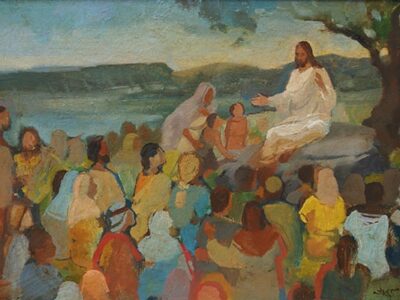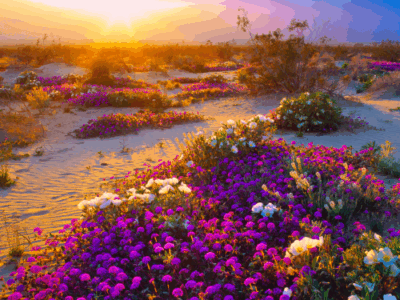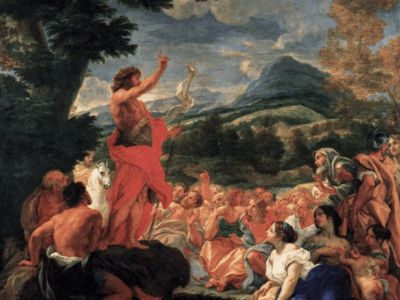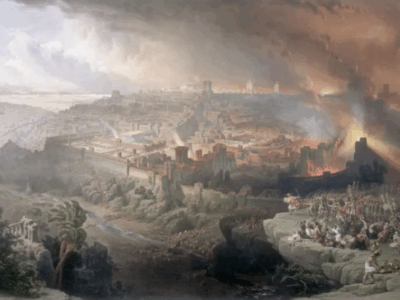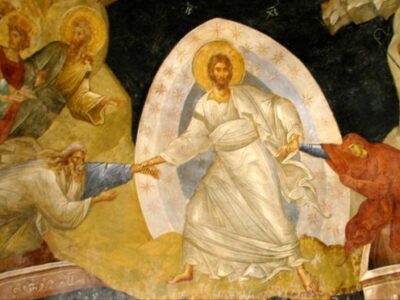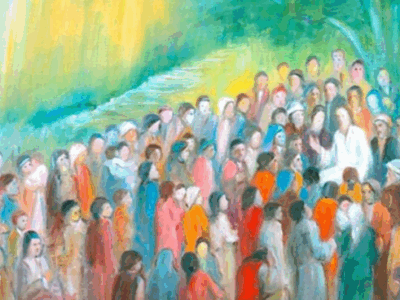
The Encroaching Kingdom
Year B
Ezekiel 17:22-24
Psalm 92:1-4,11-14
2 Corinthians 5:6-10, 14-17
Mark 4:26-34
May the words of my mouth O God… speak your truth…
When you buy a house… it’s important to know where the property lines are… where the boundaries are… ] that way… if there’s any question about just where the fence separates the two properties… if there’s any question about whose tree it is… that’s dropping rotting crabapples onto your lawn… you can know… ] and there’s a poem by Robert Frost… called Mending Wall… that addresses the ideas of property lines and boundaries… and the poem starts out this way… Something there is… that doesn’t love a wall… [ repeat ]… the poem describes how the freezing and thawing of the ground… which causes the ground to heave… throws stones one off of the other… creating an egress… an opening… that’s wide enough for two to pass through… ] and the poem talks about how hunters leave not one stone upon another… so that they can get the rabbit out from it’s hiding… to please their yelping dogs… ] the writer says that no one has ever seen or heard these things happen… but in the spring… he and his neighbor walk the line to make repairs… and as they walk… they keep the wall between them… the writer gives the assurance that his apple trees will never get across the wall and eat the cones underneath his neighbor’s pine trees… but all the neighbor says… is that good fences make good neighbors… and the writer responds by saying… that before he built a wall… he’d ask to know… what he was walling in… or walling out… and to whom he was likely to give offense…
We’re used to having boundaries… and there are boundaries which serve a good purpose… for example… the painted white lines… that separate the lanes on 131 keep cars… well at least… help prevent cars… from sideswiping each other as they careen along… ] the front door and thresholds in our homes… give us some control over who we invite in… and who we don’t… ] the healthy emotional boundaries we develop help our families to be more functional than not… ] and in our diocese [ and synod ] there’s an expectation that those in leadership take Safe Church training… which is designed to protect all of God’s children… and prevent emotional… physical… and sexual abuse… establish boundaries which help ensure safety and health… and which support our growth into wholeness…
Our border with Canada is a boundary of sorts… and our border with Mexico is another boundary of sorts… and the way we use them can be like a stone fence… with a gap wide enough to let only so many in… and so many out… depending on who they are… and why they want to come in or go out… and it’s quite reasonable to ask them those questions… to have some controls… but it’s also worth asking whether good fences ever prevent us from being good neighbors… if they are ever the cause of why we acknowledge in our confession of sin… that we have not loved our neighbors as ourselves…
The borders between the northern side of Grand Rapids and the southern side of Rockford… are encroaching on each other… in not very many years… it may be difficult to know where one ends and the other begins… and the growth may be like a weed… getting a foothold… digging in its roots… wherever it can…
And then there are boundaries which inhibit and impinge that kind of growth… which keep the Kingdom from us… and which… like stone walls… keep in what we wish we could set free… like unhealthy attitudes… behaviors… or prejudice… ] or keep out what we wish we could invite in… like God’s wisdom and welcome…
In this morning’s Gospel… we hear the parable of the mustard seed… which is found in the three synoptics… in Matthew… Mark… and Luke… the text says that it’s the smallest seed on earth… but as many of us know… it’s really not… the seeds of some orchids are so tiny that they are almost dust-like… and can be seen only under a microscope… a tool the Gospel writers did not have… even if there were orchids in that desert climate… ] but for its size… the mustard seed does grow to be quite large… but more than that… in ancient Palestine… the mustard plant was considered a weed… a bothersome… pesky… annoying weed… that is transgressive… hard to control… that takes over where it’s not wanted… and can easily encroach on what you’re cultivating…
Dr. Raj Nadella… an associate professor at Columbia Theological Seminary… writes… the Kingdom of God is like a weed that won’t stay where you plant it… and it attracts undesirables to the areas you cultivate… ] the original Greek… implies that the shrub puts forth branches large enough to shelter… to serve as a refuge… for those birds who are among the smallest creatures… and that it is large enough for the birds of the air to make their nests in its shade…
But New Testament scholar John Dominic Crossan articulates an insightful and deeply subversive aspect of this parable… that in the first century… the Jesus movement was small and vulnerable… but it stood out… because of its disruptive nature… its ability to challenge the status quo… and most importantly… for providing unexpected refuge to the unwanted… and welcome to the marginalized… ] in fact… he says that ultimately… the success of all transformative movements for justice… can be measured by how well they can infiltrate their surroundings… and meet the needs of the least powerful among them…
And Jesus says in the first part of the Gospel… that the Kingdom is as if someone would scatter seed on the ground… and would sleep and rise night and day… and the seed would sprout and grow… and he does not know how… ] because once the seed of the Kingdom is sown… it grows by itself… the process is automatic… inherent in the nature of the seed itself… and so the Kingdom grows… spreads… and offers shelter on its own terms… ] the Kingdom reaches into and transforms all aspects of life and society… and though its growth is not necessarily neat or orderly… it operates in ways that defy conventional expectations and social norms… with its surprising… dynamic… and unstoppable growth… the Kingdom turns conventional wisdom on its head… and invites a broader understanding of God’s work in the world…
Have you ever seen a small seedling push its way up through a crack in a concrete sidewalk… this is the Kingdom of Heaven at work… have you ever spoken up for someone who has been diminished or marginalized… this is the Kingdom of Heaven at work… have you ever volunteered at a food bank or fed the unhoused… this is the Kingdom of Heaven at work… have you ever supported a candidate who supported the same values that Jesus supported… this is the Kingdom of Heaven at work…
The apostle Paul talks about the already / not yet… that the Kingdom is already here… but is not quite here yet… and this teaching helps to explain the current state of Christian existence… where we experience aspects of God’s Kingdom now… but await its complete realization in the future… ] that through Jesus’ death and resurrection… the Kingdom of God has already begun… that while significant aspects of God’s Kingdom are present and active now… the complete fulfillment of God’s redemption awaits the future return of Christ… and this dual reality shapes the Christian experience… and offers us a foretaste of the coming Kingdom… and a hopeful anticipation of its final consummation…
May we do all that we can then… to dismantle every stone… to take down every wall that keeps the fullness… the ‘not yet’ part of God’s Kingdom… inaccessible to us… separated from us… so we too can ask… what we’re walling in… or walling out… and to whom we might give offense…

